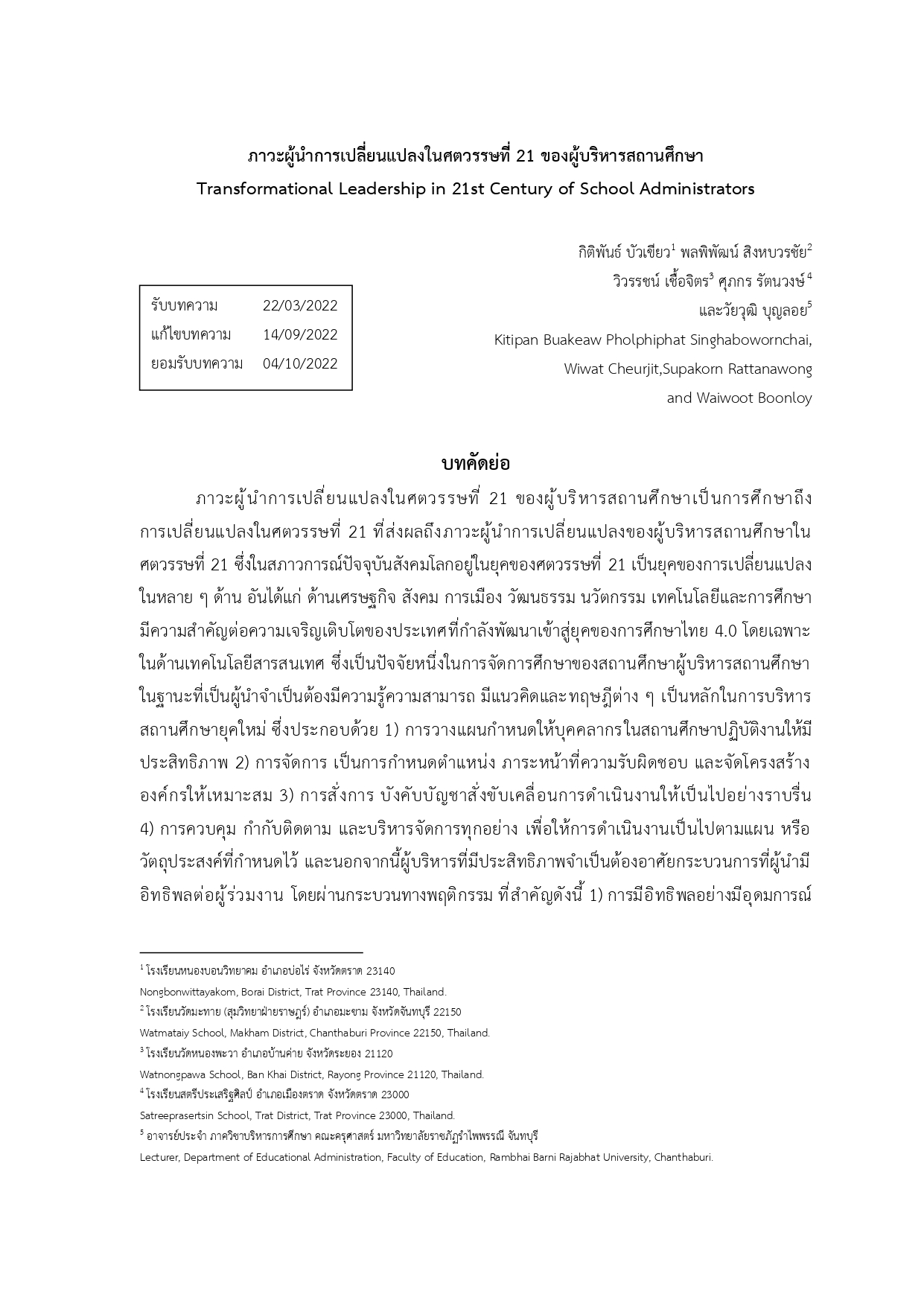Transformational Leadership in 21st Century of School Administrators
Keywords:
Leadership, Transformation in 21st, Century School AdministratorsAbstract
The 21st Century transformational leadership of school administrators is a study of the changes in the 21st century that have resulted in The transformational leadership of school administrators in the 21st century, in which the current situation of global society is in the era of the 21st century, is an era of change in many ways, including the economy. Society, politics, culture, innovation, technology and education are important for the growth of developing countries entering the era of Thai education 4.0, especially in the field of information technology, which is one of the factors in the management of educational institutions. This consists of 1) planning to require staff in the school to perform their tasks effectively, 2) managing positions, obligations and responsibilities, and structuring the organization accordingly. In addition, effective executives need to rely on processes in which leaders influence their colleagues through behavioral processes, the following are important: 1) ideological influence, 2) motivation, 3) intellectual stimulation, 4) individualization, 5) team building, therefore, the 21 century transformational leadership of school administrators is important to lead the school in an era of change. Advancement in science, creating new knowledge to prepare students and the skills needed to prepare them. Able to live a normal and happy life and affect the human resource development of the nation.
References
กุลจิรา รักษนคร และสุภัทรศักดิ์ คำสามารถ. (2563, มีนาคม-เมษายน). การศึกษากรอบแนวคิดในการพัฒนาทักษะภาวะผู้นำของผู้บริหารสถานศึกษา ในศตวรรษที่ 21. สถาบันพัฒนาการเรียนรู้ศาสตร์สมัยใหม่, 5 (2), 274-283.
เครือจิตร สีหา. (2562). แนวทางการพัฒนาภาวะผู้นำการเปลี่ยนแปลงของผู้บริหารโรงเรียน ด้านการจัดการความรู้เพื่อพัฒนาทักษะการเรียนรู้ของผู้เรียนในศตวรรษที่ 21. วารสารวิชาการ สถาบันเทคโนโลยีแห่งสุวรรณภูมิ, 5 (1), 326-335.
ชัยยนต์ เพาพาน. (2559). ผู้บริหารสถานศึกษายุคใหม่ในศตวรรษที่ 21. วารสารบริหารการศึกษามหาวิทยาลัยขอนแก่น, 2 (1), 4-5.
ธร สุนทรายุทธ. (ม.ป.ป.). หลักการและทฤษฎีทางการบริหารการศึกษา. กรุงเทพฯ: เนติกุลการพิมพ์
นิพนธ์ อนันตชาติ. (2550). ทักษะการบริหารของผู้บริหารสถานศึกษาตามทัศนะของข้าราชการครูในอําเภอเมืองชลบุรี สังกัดสํานักงานเขตพื้นที่การศึกษาชลบุรี เขต 1. วิทยานิพนธ์ศึกษาศาสตรมหาบัณฑิต สาขาวิชาการบริหารการศึกษา บัณฑิตศึกษา มหาวิทยาลัยบูรพา.
นุช สัทธาฉัตรมงคล และอรรถพล ธรรมไพบูลย์. (2559, มกราคม-มิถุนายน). ผู้นำการเปลี่ยนแปลงในยุคโลกาภิวัฒน์สู่การพัฒนาอย่างยั่งยืน. ธุรกิจปริทัศน์, 8 (1), 167.
นันทเดช สินทอง และสมบูรณ์ สารพัด. (2563, มกราคม-มิถุนายน). ความสัมพันธ์เชิงสาเหตุระหว่างภาวะผู้นำการเปลี่ยนแปลงวัฒนธรรมองค์กรและพฤติกรรมการเป็นสมาชิกที่ดีขององค์กรของพนักงานกลุ่มอุตสาหกรรมการผลิตชุดสายไฟ สำหรับรถยนต์ในนิคมอุตสาหกรรมอมตะซิตี้. วารสารนักบริหาร, 40 (1), 3-15.
พะยอม วงศ์สารศรี. (2561). กระบวนการพัฒนาสู่ความเป็นผู้นำสงฆ์. วารสาร มจร. การพัฒนาสังคม, 3 (3), 169.
พิบูล ทีปะปาล. (2550). ภาวะผู้นํา. ค้นเมื่อ ตุลาคม 11, 2564, จากhttp://krusomchart05.blogspot.com/2011/ 01/blog-post_2561.html.
พรชัย เจดามาน. (2560). ภาวะผู้นำการเปลี่ยนแปลงศตวรรษที่ 21: ไทยแลนด์ 4.0. ค้นเมื่อ ตุลาคม 1, 2564, จาก www.kroobannok.com.
ภารดี อนันต์นาวี. (2551). ความหมายของผู้บริหาร. ค้นเมื่อ 11 ตุลาคม 2564, จาก http://krusomchart05.blogspot.com/2011/01/blog-post_2561.html.
มณฑาทิพย์ นามนู. (2561). ทักษะของผู้บริหารสถานศึกษาในศตวรรษที่ 21 สังกัดสำนักงานเขตพื้นที่การศึกษาประถมศึกษาปทุมธานี เขต 2. วิทยานิพนธ์ครุศาสตรมหาบัณฑิต สาขาวิชาการบริหารการศึกษา บัณฑิตศึกษา มหาวิทยาลัยเทคโนโลยีราชมงคลธัญบุรี.
รุ่งอรุณ หงส์เวียงจันทร์, สุริยงค์ ชวนขยัน และสมสรรญก์ วงษ์อยู่น้อย. (2560, มกราคม-มิถุนายน). รูปแบบการพัฒนาภาวะผู้นาการเปลี่ยนแปลงในศตวรรษที่ 21 ของผู้บริหารสถานศึกษาขั้นพื้นฐาน ในเขตภาคตะวันตก. วารสารสารสนเทศ, 16 (1), 125-139.
วิรวรรณ จิตต์ปราณี และชุมศักดิ์ อินทร์รักษ์. (2561, ตุลาคม-ธันวาคม). ภาวะผู้นาการเปลี่ยนแปลงกับทักษะในศตวรรษที่ 21 ของผู้บริหารโรงเรียนสังกัดสานักงานเขตพื้นที่การศึกษามัธยมศึกษาเขต 2. วารสารการบริหารการศึกษา มหาวิทยาลัยศิลปากร, 9 (2), 34-49.
ศิริวรรณ เสรีรัตน์. (2545). ความหมายของการบริหารจัดการ. ค้นเมื่อ ตุลาคม 11, 2564, จาก http://www.bloggang.com/viewblog.php?id=lean-&group=1.
ศูนย์ราชการเฉลิมพระเกียรติ 80 พรรษาฯ. (2559). ทศพิธราชธรรม. ค้นเมื่อ กันยายน 15, 2565, จาก https://www.dol.go.th/ethics/Pages/%E0%B8%97%E0%B8%A8%E0%B8%9E%E0%B8%B4%E0%B8%98%E0%B8%A3%E0%B8%B2%E0%B8%8A%E0%B8%98%E0%B8%A3%E0%B8%A3%E0%B8%A1-.aspx
เสริมศักดิ์ วิศาลาภรณ์. (2550). ผู้บริหาร. ค้นเมื่อ ตุลาคม 11, 2564, จาก http://Krusomchart05.Blogspot.com/ 2011/01/blog – post_2561.html.
สำนักงานเลขาธิการคุรุสภา. (2540). เกณฑ์มาตรฐานผู้บริหารสถานศึกษา. กรุงเทพฯ: สำนักงานเลขาธิการคุรุสภา.
สำนักงานคณะกรรมการศึกษาขั้นพื้นฐาน. (2562). นโยบายสำนักงานคณะกรรมการศึกษาขั้นพื้นฐาน ปีงบประมาณ พ.ศ. 2563. กรุงเทพฯ: ชุมนุมสหกรณ์การเกษตรแห่งประเทศไทย.
อนันท์ งามสะอาด. (2550). ภาวะผู้นําสําหรับผู้บริหาร. ค้นเมื่อ ตุลาคม 11, 2564, จาก http://www.sisat.ac.th/main/index.php/2009 - 01 - 22 - 09 – 32 16/153 – 2009 – 02 – 12 – 14 – 49 – 22.
ฮิวจ์ เดลานี. (2562). การศึกษาสำหรับศตวรรษที่ 21 การพัฒนาทักษะคือหัวใจสำคัญของการศึกษา. ค้นเมื่อ กันยายน 15, 2565, จากhttps://www.unicef.org/thailand/th/stories/%E0%B8%81%E0%B8%B2%E0%B8%A3%E0%B8%A8%E0%B8%B6%E0%B8%81%E0%B8%A9%E0%B8%B2%E0%B8%AA%E0%B8%B3%E0%B8%AB%E0%B8%A3%E0%B8%B1%E0%B8%9A%E0%B8%A8%E0%B8%95%E0%B8%A7%E0%B8%A3%E0%B8%A3%E0%B8%A9%E0%B8%97%E0%B8%B5%E0%B9%88-21.
Bass, B. M. & Avolio, B. J. (1994). Improve organization effective trough transformational leadership. Thousand Oaks: Sage.
Bass ,B. M. (1997). Does the transaction-transformational leadership paradigm transcend organizational and national boundaries, American Psychologist, 52 (2), 130-132.
Koontz, W. & Weihrich, H. (1988). Management. New York: McGraw-Hill.
McFarland, D. E. (1979). Management: Foundation & Practices (5th ed.). New York: Macmillan.
Mitchell, T. R. (1987). People in organization: An introduction to organization behavior (3rd ed.). New York: McGraw-Hill.
Schwartz, Z. D. (1980). Introduction to Management: Principle, Practice and Process. New York: Harcourt Brace Jovanovich.
Stogdill, R. M. (1974). Handbook of Leadership: A survey of theory and research. New York: Free Press.
Yukl, G. (1989). Leadership in organization. Englewood Cliff, NJ: Prentice Hall.

Downloads
Published
How to Cite
Issue
Section
License
Copyright (c) 2023 Journal of Humanities and Social Sciences Nakhon Pathom Rajabhat University

This work is licensed under a Creative Commons Attribution-NonCommercial-NoDerivatives 4.0 International License.
Journal of Humanities and Social Sciences Nakhon Pathom Rajabhat University





